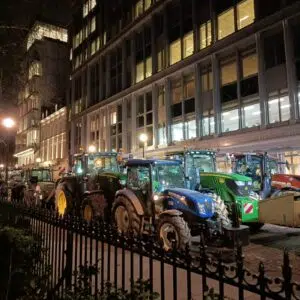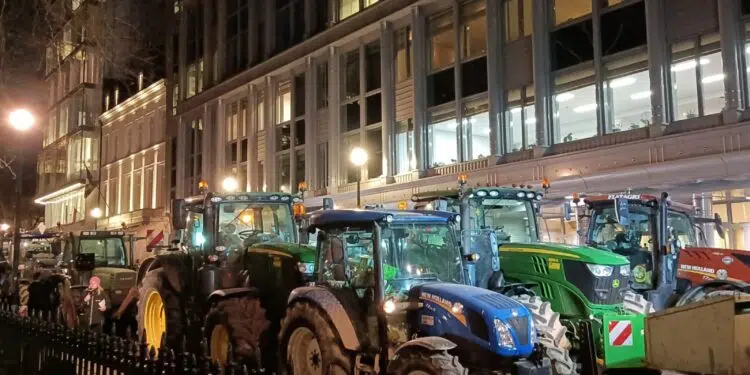Brussels – On the one hand, the extension of the suspension of import duties from Ukraine, on the other, the extension of the derogation to the Common Agricultural Policy on set-aside land for another year. On the eve of the European summit that will see EU leaders meeting in Brussels tomorrow (Feb. 1) amid protests by farmers who are threatening to blockade the capital, the European Commission is putting two proposals on governments’ plates to continue supporting Ukraine on the one hand and on the other to partially accommodate the demands of farmers, who have been protesting for weeks now in various EU countries against rising fuel prices and against EU policies considered too radical.
Just tomorrow, while EU leaders will be in the Belgian capital busy breaking the deadlock on the multi-year budget, a demonstration by farmers and trade associations is planned outside the European Parliament, even though that is not where EU policies are decided. “EU farmers put the best and healthiest food in the world on our tables. We support them with 386.7 billion euros from the Common Agricultural Policy (CAP), and in difficulties, we find common solutions,” commented European Commission President Ursula von der Leyen, describing European farmers as “the backbone” of the EU food security system.

The Commission has proposed an extension through 2024 of the waiver of some measures under the CAP that require them to maintain at least 4 per cent of certain non-productive areas, i.e., not occupied by crops to help restore nature and biodiversity. The waiver was granted to farmers as a matter of urgency for 2022 and then 2023, following the Russian invasion of Ukraine that tested EU food security.
The commission’s proposal “provides a first concrete policy response to farmers’ income concerns,” the EU executive explains in a note, pointing out that the measure will be voted on in the coming days by member states in committee. After that, the commission will proceed to formal adoption and the regulation will apply retroactively from January 1, 2024.
To balance the waiver of arable crop rules that the Commission had so far not granted for 2024 (also because this time a regulatory intervention is required), the executive decided to also extend for one year, until June 2025, the suspension of import duties, quotas, and trade defence measures on Ukrainian exports to the European Union. These so-called Autonomous Trade Measures (ATMs) in recent months have provoked a strong reaction from border countries, particularly Poland, Hungary, Bulgaria, Slovakia, and Romania. These countries have complained about logistical bottlenecks and excessive accumulations of wheat and other grains on their agricultural markets, contributing to the devaluation of their prices as well.
The countries in question have taken unilateral measures to block exports from Kyiv, in turn violating the principle of free movement of goods and risking fragmenting the European single market on several occasions. In these provisions, Brussels therefore provided an accelerated safeguard mechanism to protect the Union market “if necessary” from excessive exports, such as by placing exceptions to certain crops.
This time, the extension proposal includes enhanced safeguard instruments to counter increased imports of certain agricultural products from Ukraine to the EU (as was the case in 2022 and 2023). For the most sensitive products—poultry, eggs, and sugar—an emergency brake is provided to stabilize imports at the average volumes of 2022 and 2023. “This means that if imports of these products exceed these volumes, tariffs would be re-imposed to ensure that import volumes do not significantly exceed those of previous years,” the commission explains in a note. The commission is proposing to renew for another year the suspension of all remaining duties on Moldovan imports that have been in place since July 2022. The proposals will now be considered by the European Parliament and the Council of the European Union. The goal is to ensure a seamless transition from the current ATM regime to the new one by the time the current ones expire on June 5, 2024, for Ukraine and July 24, 2024, for Moldova.
Farmers’ protests, it is not hard to imagine, will also end up at tomorrow’s European Council, although not formally on the agenda. France is among the countries where the protests are loudest, and French President Emmanuel Macron will hold talks with European Commission President Ursula von der Leyen on Thursday. This was reported in recent days by the Elysée Palace, pointing out that the talks will take place on the sidelines of the extraordinary summit and will focus in particular on the trade agreement being negotiated between the EU and Mercosur, set-aside land imposed on farmers, and the arrival of Ukrainian products in the Union.
English version by the Translation Service of Withub






